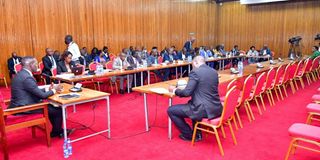Cosase can do a lot more in airline probe

Cosase chairperson, Mr Joel Ssenyonyi, and committee members on August 23, 2022. PHOTO | DAVID LUBOWA
What you need to know:
The issue: Uganda Airlines probe
Our view: Cosase has to subject Uganda Airlines’ viability model to a stress test.
A parliamentary probe into the goings-on at the flag carrier of Uganda entered the second workweek yesterday. The first workweek saw the House’s Committee on State Authorities and State Enterprises (Cosase) expose hidden unpleasant parts of Uganda Airlines.
In the main, the vast bulk of issues that came to light were deeply personal. Most of them touched the person of the airline’s chief executive, Ms Jenifer Bamuturaki. Mr Joel Ssenyonyi—the Cosase chairperson—said while this was done with good reason, it didn’t insulate him from receiving threats.
To steer clear of such damaging and distracting sideshows, Cosase needs to zoom into the structural crisis the national carrier finds itself in. The biblical losses totalling just under Shs500b in three years aren’t entirely attributable to the Covid-19 pandemic as some would want us to believe. Numbers to support the aforesaid proposition won’t fall into Cosase’s lap.
The committee members will have to put forward cogent arguments during the inquisition. They should dispense with a strategy to prevail by appealing to the hearts of Ugandans rather than their heads. Ultimately, empirical evidence is the reasonable measure by which to pass judgement on Uganda Airlines. What, for instance, are the national carrier’s pre-pandemic, pandemic and post-lockdown loss or profit margins?
Hypotheses can also be made. What, for one, would the balance sheet of Uganda’s flag carrier have looked like if there were no pandemic curbs and their attendant effects to worry about? Above all, what do the passenger numbers from January of 2022 to date look like?
Taken together, the answers to these questions can help one hazard a guess—an informed one at that—about whether Uganda Airlines is salvageable or not. Government has always held that Uganda Airlines is a “national asset” because it has the potential to be an enabler. Since the national carrier connects people, government functionaries further argue, this connectivity could quite easily translate to productivity. The hard evidence, however, shows that the aviation industry supported 5.6 per cent in GDP across Africa pre-pandemic. Covid-19 halved this number, forcing industry players—including some of Africa’s leading lights like Ethiopian Airlines—into a rethink. Most have found rich rewards in the cargo service business. It doesn’t hurt to also control the supply chains à la the flag carrier of Ethiopia.
To ensure that the work it’s doing doesn’t come off as performative, Cosase has to subject Uganda Airlines’ viability model to a stress test. The first week of the probe brought with it many anecdotes that duly went viral. While there was much anecdotal evidence unearthed, there was little hard fact to give an indication of the turbulence the airline is grappling with. Cosase’s decision to summon the Finance as well as the Works and Transport ministers offers an opportunity to get a sense of the direction.
In 2015, government passed up the opportunity to venture into the provision of cargo services. Uganda Air Cargo Corporation requested $208m to transform the company into a cargo airline. Government instead opted to spend $709.8m to buy half a dozen planes outright. While Uganda Airlines has gone on to post successive operating losses, profits recorded by Uganda Air Cargo Corporation have allowed it to expand its fleet. Hard facts were not interrogated back then, and—it appears—are still not. Cosase should establish why this is the case.
Our commitment to you
We pledge:
- To be accurate and fair in all we do.
- To be respectful to all in our pursuit of the truth.
- To refuse to accept any compensation beyond that provided by Monitor Publications Ltd. for what we do in our news gathering and decision-making.
Further, we ask that we be informed whenever you feel that we have fallen short in our attempt to keep these commitments.




